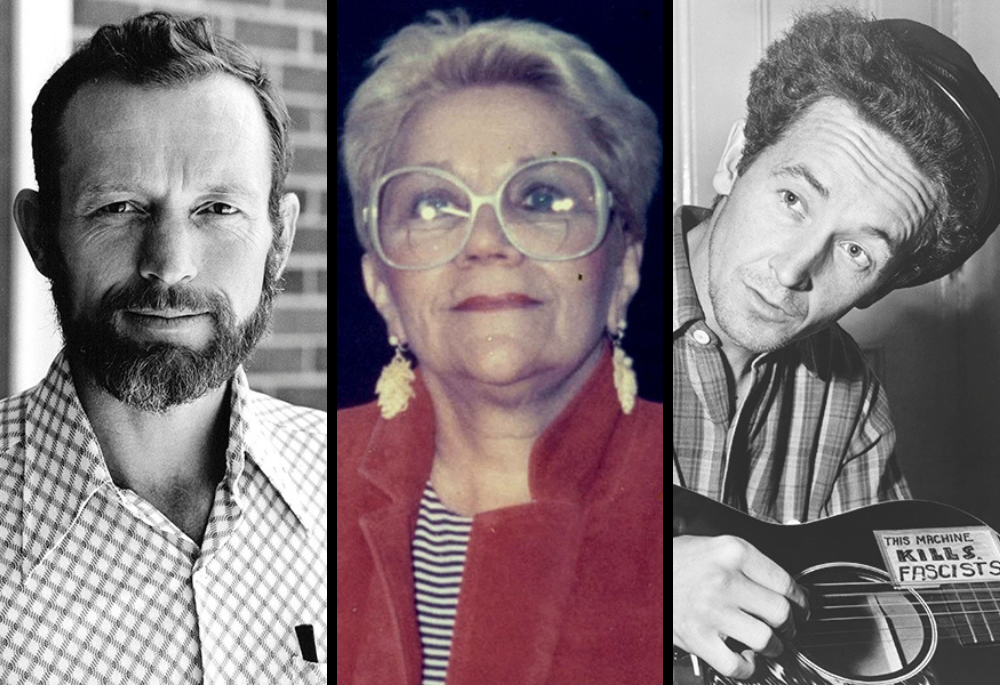
From left: Blessed Stanley Rother; Helen Marie Janning Guthrie, pictured in an undated photo; and Woody Guthrie playing a guitar that has a sticker reading: "This Machine Kills Fascists" (CNS/Charlene Scott; Courtesy of Larry Guthrie; Wikimedia Commons/Al Aumuller/New York World-Telegram and the Sun)
The western Oklahoma German Catholic community in the 1930s was an outpost and a fortress, producing incipient saint Blessed Fr. Stanley Rother; Dust Bowl survivor and White House staffer Helen Marie Janning Guthrie; and balladeer and social justice activist Woody Guthrie.
The epicenter here was St. Peter and Paul Parish in Anthon, Oklahoma, a small farm community parish now only a Catholic cemetery. These three people were unified by their western Oklahoma/Texas panhandle roots, culture-seasoned Catholicism, the pain of the ravaging Dust Bowl, and the distances traversed across cultures to deliver their life's social justice messages for the poor.
On "Black Sunday," April 14, 1935, which was also Palm Sunday, the worst of all dust storms came barreling through the Texas and western Oklahoma panhandles. Stanley was barely a month old (born March 27, 1935) in Okarche, Oklahoma; Helen, daughter of Frank and Mary Janning, was almost 5 years old in Anthon, Oklahoma; and 23-year-old Woody, inspired by the "great storm," began writing Dust Bowl ballads in Pampa, Texas.
Today, Oklahoma attains world stature for Rother, the first U.S.-born Catholic martyr and incipient saint, accompanied by the planned $80 million shrine in Oklahoma City. He further parallels another world-renowned Oklahoman: Woody Guthrie.
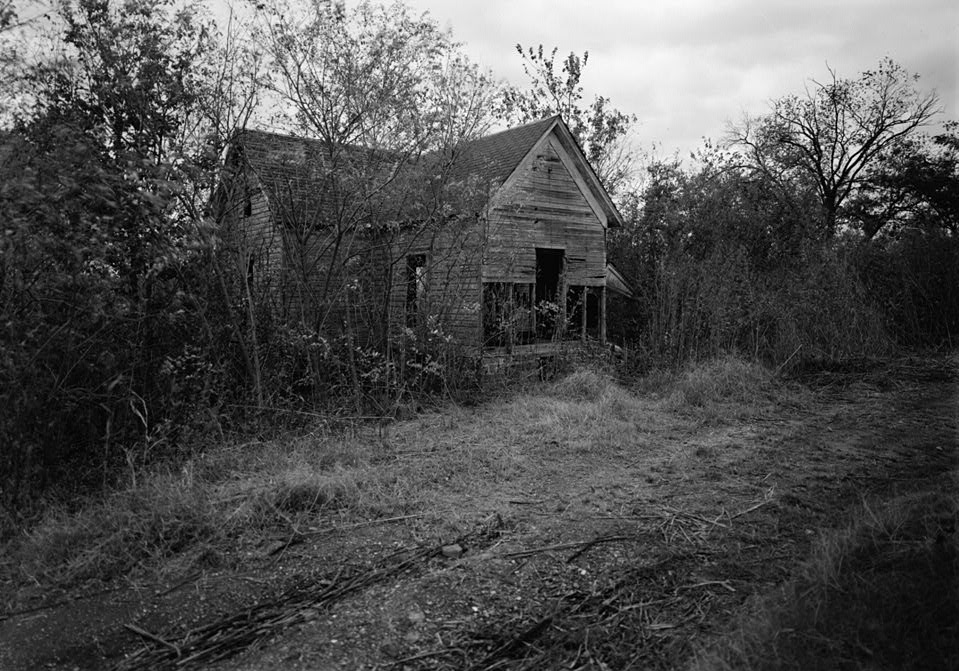
The birthplace of Woody Guthrie in Okemah, Oklahoma (Wikimedia Commons/Library of Congress, Prints and Photograph Division, Historic American Buildings Survey: HABS OKLA,54-OKE.V,1-1)
Stanley and Woody were born 100 miles from each other in Okarche and Okemah, respectively. In a type of historical solidarity, Stanley's beatification on Sept. 23, 2017, in Oklahoma City took place about a week before the 50th anniversary of Woody's death on Oct. 3, 1967.
In The Shepherd Who Didn't Run, Sr. Marita Rother, a member of the Adorers of the Blood of Christ and Stanley's sibling, describes his "complete dedication to serve 'the poorest of the poor.' "
In 1968, Stanley drove the 2,500 miles from Okarche to Santiago Atitlan, Guatemala.
The Guerrilla Army of the Poor was organized to oppose the Guatemala "Army's brutal counter-insurgency strategy" in the 1980s, according to María Ruiz Scaperlanda, author of The Shepherd Who Didn't Run. "Guatemala is systematically doing away with all liberal[s] or even moderates in government, [as well as] the labor leaders and apparently there are lots of kidnappings that never get in the papers."
A new resistance group, the Revolutionary Organization of Armed People, or ORPA, was formed in the late 1970s. In June 1980, ORPA marched into Santiago Atitlan and occupied the town square. Some of Stanley's parishioners were in attendance. Stanley was murdered on July 28, 1981. "That's why Bishop [Angélico] Melotto could say he was a martyr of charity," Scaperlanda writes. "There's a very, very fine line between Christian charity and moving people to be active against the government. It's almost impossible to make the distinction."
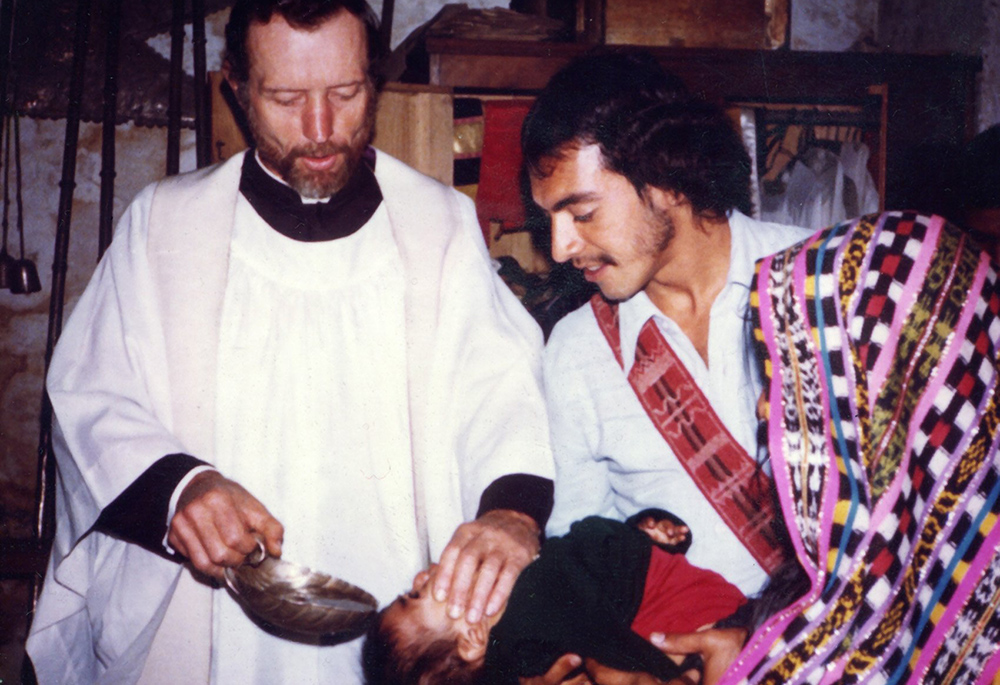
Blessed Stanley Rother, left, a young priest from Oklahoma, served impoverished indigenous people in Guatemala. In 1981, Father Stanley Rother became the first American citizen to be martyred. (CNS file photo)
Woody, "Poet of the People," took a journey of his own in 1940, traveling 2,800 miles from Los Angeles to New York via Pampa, Texas, to write, "This Land is Your Land."
As a youth, Woody studied Kahlil Gibran, and considered converting to Catholicism and taking holy orders to become a priest. He was married to Mary Jennings in Holy Souls Church in Pampa, Texas (now St. Vincent de Paul Parish).
Woody showed courageous defiance for working people.
"In Peekskill, New York, in the summer of 1949, Woody Guthrie led a group of terrified folksingers in a desperate rendition of 'We Shall Not Be Moved' as their car crawled down a bumpy country lane," Scott Linford writes in his review of Will Kaufman's book Woody Guthrie: American Radical. "They were coming from an outdoor concert benefitting the Civil Rights Congress, with Guthrie, Paul Robeson, Pete Seeger, and others performing in spite of thinly veiled threats from the local police and a blockade of protests by American Legionnaires and plainclothes Klansmen."
Advertisement
Helen's journey took her 1,450 miles from Anthon to Washington, D.C. After raising her eight children in the Catholic faith, Helen was appointed by then-President Ronald Reagan to his White House staff in 1986. The last thing Reagan did before leaving for his famed Reykjavík meeting with Mikhail Gorbachev was to tell Helen goodbye on her last day at the White House.
Many western Oklahoma Catholics were German-Americans staving off suspicion leading up to World War II. The Jannings had two sons fighting in the U.S. Navy and U.S. Army (later Air Force) as reported in The Daily Oklahoman in 1939. They spoke German at home until the war started, then only English. "Gelobt sei Jesus Christus" ("Praised be Jesus Christ") was a familiar saying in their household.
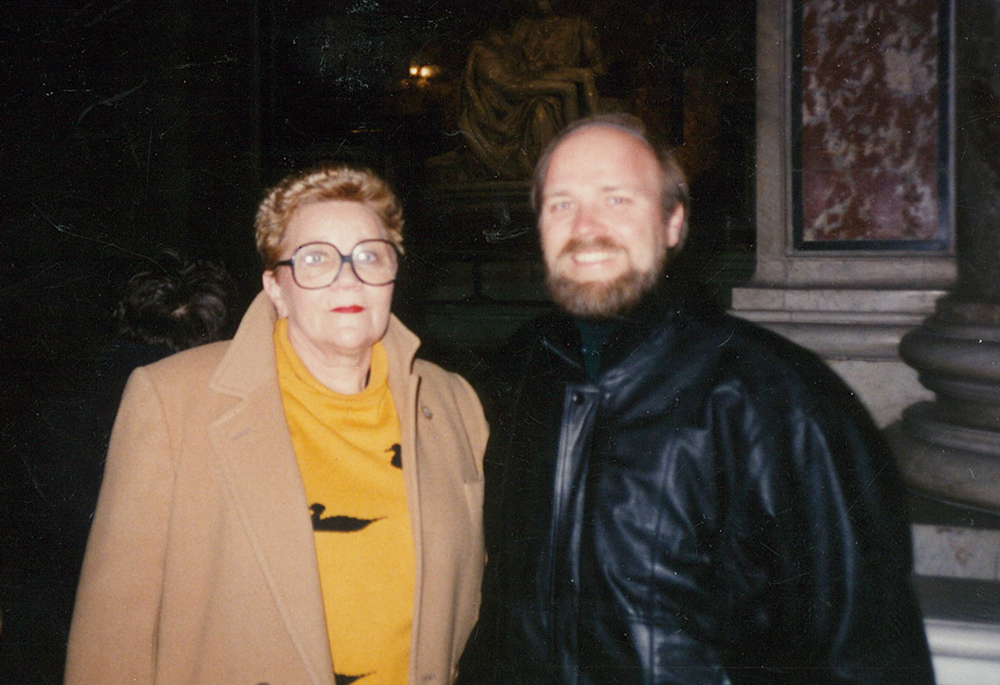
Helen Janning Guthrie and Larry Guthrie in front of the Pieta at St. Peter's Square in Rome in an undated photo (Courtesy of Larry Guthrie)
Helen told me that one Christmas Eve, her father asked if she would go to midnight Mass with him. She said yes and went outside to get in the car. Her father said, "No, we are walking. The gas is for the war effort." So, they walked the few miles to St. Peter and Paul.
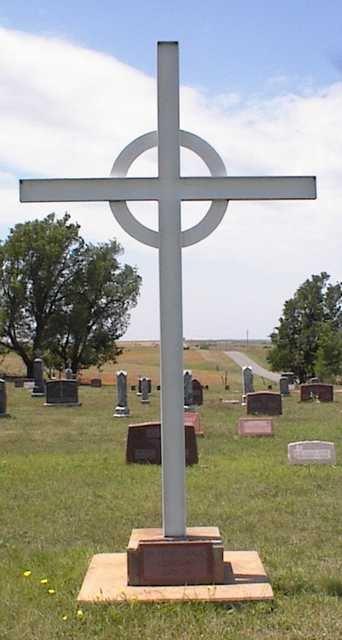
The St. Peter and Paul Cemetery at Anthon, Oklahoma where much of the Janning family is laid to rest. The Janning farm was a couple of miles down this road. (Courtesy of Larry Guthrie)
Since they were in "mission territory" and did not have a priest every week, Mary Janning would say, "We get to go to Mass today." After Mass, the Jannings would have Sunday dinner at their farm home. They would hold hands before departing to savor the moments together before longing for their next gathering, fighting dust storms in between. Frank Janning watched his crops blow away for seven years in a row during the Dust Bowl. When the wheat finally grew again, he let Helen ride on the combine harvester for the first swath of the wheat harvest.
On the day World War II started, Helen and her father had driven from their farm in Anthon to Okarche, 71 miles away, to another German-American Catholic community where Rother's family farmed and attended Holy Trinity Catholic Church. They ate the famous fried chicken at Eischen's Bar — founded in 1896 by German Peter Eischen — heard the news that the war had started and then drove back to Anthon. The Janning boys were called to war and told to take the train to California on Christmas. Helen asked her mother, "What are we going to do?" She replied, "We are going to have Christmas," and continued cooking.
Helen ran for Congress to expand her flock. There was once a homeless man in Tulsa, Charlie Williams, who would stop by Helen's house. She would have coffee with him on the front porch and give him clothes and money as needed. When he died, they found a note in his pocket which read,"Next of Kin: Helen Guthrie."
In a way, all three were shepherds: Stanley to his parishioners in Santiago Atitlan, Guatemala; Woody to his migrant flock of "Dust Bowl refugees" seeking work and better working conditions and all who proclaim, "This Land Is Your Land"; and Helen to her eight children and her numerous devotees seeking her counsel, love and assistance.





